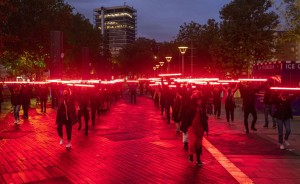Business West, the group that runs Bristol Chamber of Commerce, has welcomed the latest government job and self-employment support measures – but warned that many firms, including those in the city’s vital hospitality and events sectors, continue to miss out.
The new support package was announced yesterday by Chancellor Rishi Sunak as businesses in many areas of the country face new hardship as their towns and cities are put under new, tighter restrictions. 
Business West managing director Phil Smith, pictured, said that while Bristol and the rest of the South West remained in the less severe Tier 1, this meant some firms that could not operate and needed support – such as event organisers – would find they were still ineligible. This is in contrast to some businesses in Tiers 2 and 3 that were being forced to close.
Earlier this month around 200 event professionals from various sectors of the industry performed in Bristol city centre, pictured below, to highlight the impact on the sector of the restrictions and support the 40,000 people in the city who make events.
Mr Smith welcomed the changes to the Job Support Scheme (JSS) and Self Employed Income Support Scheme announced by Mr Sunak and aimed at helping employers and unincorporated businesses weather the storm as the impact of the coronavirus pandemic continued to be felt by firms across the country.
“By reducing the contribution employers need to make to retain their staff for their non-working hours on part time hours on the Job Support Scheme from 33% to 5% more businesses will be able to afford to use the scheme for their workers incomes to be protected,” Mr Smith said.
“The number of hours each employee on JSS needs to work for their employer has also been reduced from 33% of their contractual hours down to 20%, helping businesses use the scheme where demand for their goods and services is lower due to the impacts of Covid-19.
“The take home salary of the employees under JSS remains unchanged at 67% or higher – the government has increased the share borne by the government, and the maximum contribution rises to £1,542 per employee per month.
“However, there was no help for businesses who are not able to operate at all, such as the events sector, but are not required to close under local lockdowns under Tier 2 and 3.” 
As all areas of the South West remained in Tier 1, these businesses were not eligible for new grants based on hospitality businesses who were impacted by restrictions brought into other areas such as in the North West and London, he said.
“Unincorporated businesses in the region will also be breathing a sigh of relief as the Self Employment Income Support Scheme (SEISS) grant from November 1 onwards is doubled to 40% of profits from 20%, but eligibility remains what it was from the scheme’s inception and the generosity is still considerably lower than 70-80% of profits earlier this year.”
He said while any help for the regions embattled businesses was welcome, there was a long winter to come for firms remaining between the gaps in the various schemes.
Earlier this week Business West, which also runs the Bristol Initiative, joined business organisations from across the UK to write to the Prime Minister calling for a new approach by the government to limit the impact of coronavirus restrictions on businesses and jobs and take a long-term approach to tackling the pandemic.
Event demonstration photo by Paul Box






























